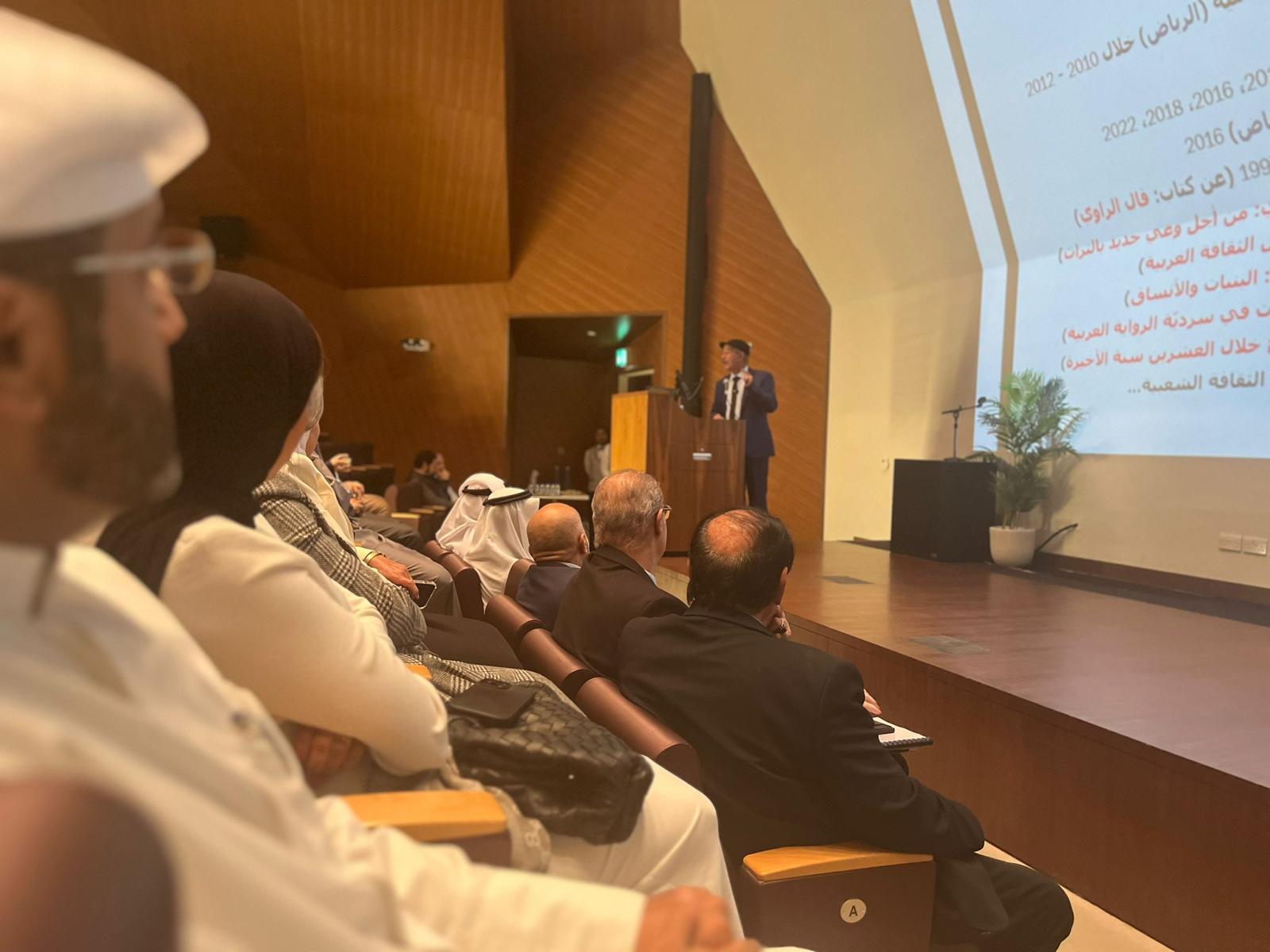
Within the framework of promoting scientific culture and encouraging excellence and innovation, Kuwait University, in cooperation with Kuwait Foundation for the Advancement of Sciences (KFAS), hosted a series of lectures presented by a group of scientists and researchers who recieved the annual awards granted by the Foundation for the years 2022-2023, on Wednesday 11 December 2024 at the Colleges of Science and Arts in Sabah Al-Salem University City, in the presence of an audience of academics.
These lectures came with the aim of highlighting the distinguished scientific achievements and presenting a platform for the exchange of knowledge and experiences between academics and students at Kuwait University, covering various fields including natural sciences, engineering, medicine, humanities, and social sciences, where each winner gave a detailed presentation of his research and achievements that qualified him to win the award.
This cooperation represents an important step to enhance the partnership between Kuwait University and the Kuwait Foundation for the Advancement of Sciences (KFAS), through which the university seeks to inspire academics, researchers and students and encourage them to pursue innovation and scientific research, reflecting the importance of taking initiative in supporting the scientific community and enhancing the role of scientific research in building a bright future for Kuwait.
In this context, researcher Prof. Muhammad Al-Dawoudi, who won an award in the field of basic sciences and who works as a professor in the Department of Chemistry and General Director of the Center for Advanced Membranes and Porous Materials Research in the Department of Physical Sciences and Engineering at King Abdullah University of Science and Technology in the Kingdom of Saudi Arabia, gave a scientific lecture summarizing his winning research entitled "Network Chemistry: From Design Strategies to Applications, and Metal-Organic Frameworks (MOFs) as Adsorbents and Potential Membranes for Energy-Intensive Separation and Carbon Capture".
His research focuses on improving existing materials and searching for new methods to design new materials; This is a valuable and worthy path to pursue in order to address the technological challenges facing humanity, and thanks to the progress in network chemistry and the various design strategies that have been developed to effectively practice energy and environmental sustainability applications, his research has developed ways to address energy-intensive separation processes and carbon capture.
For his part, researcher prof. Mohamed Al-Hadi Omar Al-Matousi, winner of an award in the field of emerging specialized sciences, who works as a professor of chemistry and biochemistry at the University of Florida, USA, gave a lecture explaining his research in the field of emerging specialized sciences in nano-sciences entitled "Evaluation of Catalytic Efficiency Using AuNP−Peptide Conjugates", where his research provided a strategy for developing highly sensitive and stable biosensors for cancer detection and tissue imaging. He provided researchers with an effective strategy using cooling as a signal transfer mechanism in order to develop a variety of analytical biosensors.
Dr. Muhammad Sultan, Professor of Remote Sensing and Environmental Sciences and Director of Remote Sensing at Western Michigan University, gave a lecture entitled "Contributions of Remote Sensing to the Study of Hydrological Systems in Arid Regions", in which he reviewed the most important results of his research that uses advanced technologies to study hydrological systems in arid lands, to monitor groundwater storage in the Sahara Desert and the Arabian Peninsula, studying the impact of hurricanes on groundwater recharge, and analyzing the impact of climate change on them.
In the College of Arts, Prof. Saeed Abdulqader Yaqteen, winner of the Kuwait Prize for 2022 in the field of humanities, arts, and literature, gave a lecture entitled "Towards a Cognitive Theory for the Study of Literature".
In this regard, Prof. Saeed Yaqteen spoke about Arabic literature and its impact on the modern digital revolution in the world in general, noting that Arabic language departments, although they have a long and deep history, have not been renewed to keep pace with the development of society.
He pointed out that literary studies are rich and numerous, but they lack specificity as to whether they are criticism, art, or science, and this is the ongoing confusion that occurs, indicating that in order to achieve this specificity, we must restrict the specific foundations of each field.
He added: "We have reached a neutral zone between authenticity and modernity, where we have plateaued, and this is what prevents us from developing because our relationship with literature is at the same pace."
At the end of his speech, Prof. Saeed Yaqteen urged professors and students to develop a cultural vision to be thinkers and scientific researchers, and this is where literature can be developed, considering that individuals are the capital of the Arab nation and the pillars of development.
It is worth noting that the Kuwait Prize aims to support scientific research in its various branches and encourage Arab scientists and researchers. The prize is awarded in five fields, four of which are annual, namely basic sciences, applied sciences, economic and social sciences, arts and literature, while the fifth is awarded every two years in the field of emerging specialized sciences.


 Colored
Colored Grayscale
Grayscale

